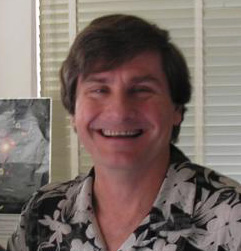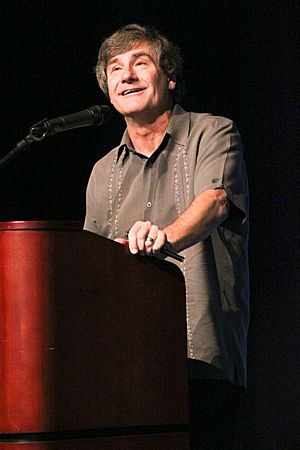Alex Filippenko facts for kids
Quick facts for kids
Alex Filippenko
|
|
|---|---|
 |
|
| Born |
Alexei Vladimir Filippenko
July 25, 1958 Oakland, California, U.S.
|
| Education | University of California, Santa Barbara (B.A. 1979) California Institute of Technology (Ph.D. 1984) |
| Known for | Studies of supernovae, active galaxies, black holes, accelerating expansion of the Universe |
| Spouse(s) | Noelle Filippenko |
| Children | 4 |
| Awards | Newton Lacy Pierce Prize in Astronomy Guggenheim Fellowship Gruber Prize in Cosmology Breakthrough Prize in Fundamental Physics Carnegie/CASE National Professor of the Year Richard H. Emmons Award Robert M. Petrie Prize Richtmyer Memorial Award Carl Sagan Prize for Science Popularization |
| Scientific career | |
| Fields | Astrophysics |
| Institutions | University of California, Berkeley |
| Thesis | Physical conditions in low-luminosity active galactic nuclei (1984) |
| Doctoral advisor | Wallace L. W. Sargent |
| Other academic advisors | Stanton J. Peale Hyron Spinrad |
Alexei Vladimir "Alex" Filippenko (born July 25, 1958) is an American astrophysicist and professor of astronomy. He teaches at the University of California, Berkeley. He is known for his important work on supernovae (exploding stars) and active galaxies. He also studies black holes and the way the Universe is expanding.
Alex Filippenko earned his bachelor's degree in physics in 1979. He then got his Ph.D. in astronomy in 1984. He started teaching at Berkeley in 1986.
Contents
Discovering the Expanding Universe
Alex Filippenko was part of two major science teams. These teams used observations of a special type of exploding stars called Type Ia supernovae. They discovered that the Universe is expanding faster and faster! This amazing discovery also suggested that something called dark energy exists.
This finding was named the top science breakthrough of 1998. The leaders of these two teams later won the Nobel Prize in Physics in 2011 for this work.
Robotic Telescopes and Supernovae
Filippenko created and operates the Katzman Automatic Imaging Telescope (KAIT). This is a fully robotic telescope that automatically searches for supernovae. From 1998 to 2008, KAIT found over 650 supernovae. This made it the most successful telescope for finding nearby supernovae at that time.
His research helped scientists understand how different types of supernovae explode. He also showed that many supernovae are not perfectly round when they explode. This information is important for using supernovae to measure distances in space.
Black Holes and Galaxies
Filippenko's early work showed that the centers of most bright galaxies are very active. This activity is similar to what happens in quasars. It is caused by gas falling into a supermassive black hole at the galaxy's center.
He also helped show that many galaxies have a supermassive black hole at their core. He found strong evidence for smaller, stellar-mass black holes in several star systems. His robotic telescope, KAIT, also made some of the first measurements of the light that appears after gamma-ray bursts. These are powerful explosions in space.
Alex Filippenko in Media
Alex Filippenko often appears in TV shows about science. You might have seen him on the History Channel series The Universe or How the Universe Works. He has been in more than 120 science documentaries.
He also teaches through video courses. One popular series is Understanding the Universe, which has 96 half-hour lectures. He also has courses like Black Holes Explained and Skywatching: Seeing and Understanding Cosmic Wonders.
With co-author Jay M. Pasachoff, Filippenko wrote an astronomy textbook called The Cosmos: Astronomy in the New Millennium. This book has won awards and is now in its fifth edition.
Awards and Recognition
Alex Filippenko has received many awards for his scientific work. He won the Newton Lacy Pierce Prize in Astronomy in 1992. He also received a Guggenheim Fellowship in 2000. In 2007, he was recognized with the Gruber Cosmology Prize for his work on the accelerating expansion of the Universe. He shared the 2015 Breakthrough Prize in Fundamental Physics with other scientists for this same discovery.
He has also won many awards for his teaching and for sharing science with the public. In 2006, he was named the US National Professor of the Year. He also received the Carl Sagan Prize for Science Popularization in 2004. The students at Berkeley have voted him their "Best Professor" nine times!
Personal Life
Alex Filippenko is married to Noelle Filippenko. They have four children: Zoe, Simon, Caprielle, and Orion.
See also
 In Spanish: Alexei Filippenko para niños
In Spanish: Alexei Filippenko para niños
 | George Robert Carruthers |
 | Patricia Bath |
 | Jan Ernst Matzeliger |
 | Alexander Miles |


